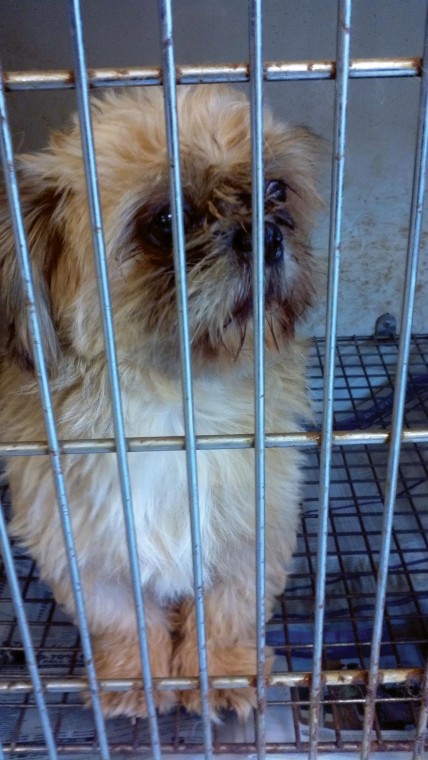Community hounds local pet store
October 11, 2011
“How much is that doggie in the window?” is a question of little importance to concerned Iona students and New Rochelle community members as they pass by the storefront of the New Roc Doggie Spot. Though the pleading puppy-dog eyes beckon potential customers to take them home, the concerned community realizes that this doggie comes at a much greater cost than expected.
Located around the corner from the popular New Roc City complex, the New Roc Doggie Spot is in an active area brimming with potential customers. The pet store, which has been in business for the past year and a half, has just recently appeared on the radar of many New Rochelle animal lovers, not because of the adorable pets but because of the conditions of the store and the welfare of its animals.
A Sept. 23 visit to the store revealed unpleasant conditions. A strong, foul odor permeated the premises, and puppies were kept in small and unsanitary cages, often in contact with their own waste. Many of the dogs lacked food and water in their enclosures. More than a few of the animals appeared soiled or ill. The environment was chaotic: puppies barked, paced, whined and pawed at the wire doors of their cages.
The consensus among affected individuals is a desire for vast improvement.
The New Rochelle Humane Society confirmed the public’s concern by acknowledging that they have received numerous complaints about the store. Many Iona students have expressed this desire for change and have rallied for increased awareness on the issue. One student composed an e-mail addressing the conditions of the pet store, which has circulated around campus.
In the e-mail, the concerned senior said, “It breaks my heart to see animals treated so cruelly. No animal should be put in this type of environment!”
To conclude the message, the student urged the recipients of the e-mail to call the ASPCA or file a complaint about the pet store through the New York State Department of Agriculture.
Although several students have taken initiative by contacting the appropriate organizations about the issue, many of the efforts have fallen short of fruition. Despite being contacted multiple times, the ASPCA’s responses to students have been scarce. When reached, officials simply disclosed that investigations have been taking place.
This failure to respond may allude to a larger problem at hand concerning animal rights. Laws protecting animals are minimal and only seem to provide for basic needs. The legislation is often vague, and compliance is relatively easy.
While Article 26-A of the New York Agriculture & Markets Law specifies minimum standards of care for animals in pet shops, many loopholes exist that undermine legal attempts to protect animals. For example, no dimensions or amounts are specified as to what may pass as “adequate space” or “sufficient nutrition” to house and feed an animal.
Obtaining a license to sell animals is cheap and simple, and penalties concerning violations of these laws are also minimal and do not pose much of a threat to offenders. Fines range from $50 to $1000. Such legislative lenience contributes to the poor conditions that persist in pet stores.
A follow-up visit to the shop on Oct. 2 presented a slight improvement in conditions. At this time, the cages were equipped with water bottles and most dogs were provided with food. The store kept up a more sanitary appearance as employees hustled to clean up after the animals. However, several of the dogs still showed signs of possible illness and poor grooming. Cage doors did not shut securely, and one dog risked injury with his head lodged in a partially secured door.
Reputable animal advocacy organizations, such as the ASPCA, the Humane Society of the United States (HSUS) and PETA, work to spread awareness of the abuses to animals fueled by the pet industry and demonstrate a strong opposition to commercially sold puppies. The ASPCA has launched a campaign titled “No Pet Store Puppies” urging potential pet owners not to buy animals or pet supplies at stores that sell puppies. The HSUS pursues a similar campaign endorsed by singer Colbie Caillat.
The HSUS affirms that a majority of the puppies sold in pet stores come from puppy mills and that buying anything from these businesses supports the cruel puppy mill industry. The HSUS warns potential pet owners to be aware of the “cruelty behind the cuteness.” Alternatives to buying pet store puppies do exist. Animal welfare organizations strongly recommend adoption from the local shelter to be considered as the first option. Adoption helps to counteract the pet overpopulation epidemic and can save the life of at least one homeless animal. Another potential option is to purchasing the puppy from a reputable breeder.
Iona students make it clear that this is an important issue and fight to foster awareness and change.
“Animals can’t speak for themselves. If you see something, be the one to take a stand and make sure that what you want done gets done,” said a concerned Iona junior. “Even if the pet store doesn’t close, it’s my duty, as well as that of other students, to continue checking on the store and report abuses.”
For more information on pet store puppies visit http://www.nopetstorepuppies.com/ or the ASPCA and HSUS homepages.








